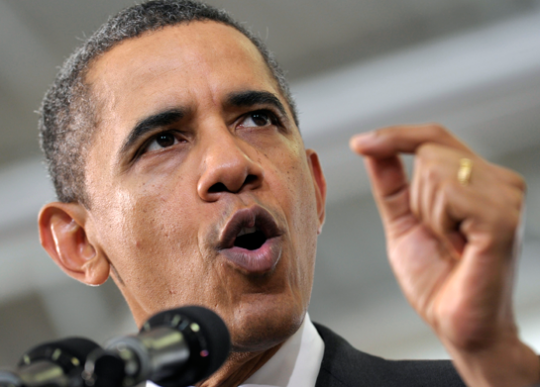Americans face in 2013 the largest tax increase since World War II and there is little hope of President Barack Obama or the divided Congress dealing with the looming crisis until after the November election, according to financial and budgetary experts.
Expiring tax cuts, new Obamacare tax hikes, and automatic cuts resulting from "sequestration" will cost Americans between $300 and $700 billion in 2013 if nothing is done. Analysts at Strategas, a global financial consultancy, say Obama’s campaign rhetoric has painted him into a corner that will make it impossible to resolve the crisis before Election Day.
"If Congress does not act within the year, the drag will be twice as large as the largest tax increase since World War II," analyst Daniel Clifton said. But Obama "can’t accept the entire package of tax cuts because of how he is campaigning."
Clifton predicts that the expiring cuts, pending hikes, and sequester cuts will drag the economy down by $573 billion, or 3.5 percent of gross domestic product; that would be double the burden of the tax increase implemented by Democrat Lyndon Johnson to fund his Great Society campaign in 1968.
The nonpartisan Congressional Budget Office predicts the economic drag will cause a 2 percent decline in real GDP for the year. The majority of the increases will come from the expiring Bush tax rates that Obama extended in 2010.
The president has painted low taxes as a boon for the wealthy.
But the loss of the Bush rates, as well as expiring payroll tax cuts and $26 billion in Obamacare taxes, will devastate lower- and middle-class Americans, whose taxes would rise by as much as $200 billion, experts say.
"We’ll move millions of low and middle income Americans onto the tax rolls for the first time in a decade," said Ike Brannon, director of economic policy at the American Action Forum. "People making between $50,000 and $75,000 would pay on average $2,200 more in taxes."
Analysts have dubbed the expected financial fallout the "fiscal cliff." The term is also gaining steam on Capitol Hill.
"It could be a 10 percent cut in disposable income," said a Budget Committee staffer who spoke on the condition of anonymity. "If that happens in the beginning of the year, a whole lot of economic activity may just stop—it’s definitely enough to put us back in recession."
That is the scenario Strategas sees playing out.
"Profits are a leading indicator and that’s what’s making the economy more vulnerable to shock," Strategas chief economist Don Rissmiller said on a Tuesday conference call with clients. "Taxes can be changed in one: You go to sleep with one set of rules and wake up with another; that has the nature to shock."
Congressional deadlock is likely to continue with less than 20 working days left on the congressional calendar and many politicians focused on reelection. There is also little hope for the White House to push for action during the lame duck session between the election and inauguration. An Obama victory will be seen as a mandate for tax increases, while a Republican victory would lead the GOP to wait until Romney assumes office before hashing out a deal.
Tax cuts can be applied retroactively, according to budget staffers, who predict the situation may not be resolved until April 2013.
Such a solution would still endanger the shaky economic recovery, however.
"The problem is with withholding. Once a company sets your level, you probably wouldn’t get it back until your tax refund in 2014," another staffer said. "There’s no chance we will avoid disruption. We can only ameliorate it later."
The so-called sequester, which would automatically cut $1.2 trillion from defense and domestic budgets, will be triggered on Jan. 1, 2013, unless Congress can agree on an equally large deficit reduction plan. The automatic cuts could result in layoffs of federal employees and private contractors. It is unclear how an eventual deal could possibly undo the damage that would result, according to the staffer.
House Budget Committee Chairman Paul Ryan’s proposal to avoid sequester stalled in the Senate.
The best case scenario for taxpayers—an extension of all tax cuts and the replacement of the sequester with a long-term debt reduction plan—would still leave the country at a loss, a Strategas report says, because "the U.S. economy has become addicted to fiscal stimulus over the course of the past decade."
The group classifies tax cuts and an influx of government spending as stimulus. The economy has experienced seven waves of this form of stimulus in the past 10 years, according to the report. Extending the tax cuts would uphold the status quo, Clifton said.
"This package would provide no new stimulus to the economy; it would only negate a negative shock to the economy," he said. "It seems to us that current policy cannot hold."
The economy may begin to falter before the election because of the looming threat, said Strategas managing partner Jason Trennert.
"Uncertainty is inconsistent with risk taking," he said. "The closer we get to the election, the less likely it is that companies are going to take risks and that’s going to have a killing effect on business in the 3rd and 4th quarters."
Wall Street may be acutely aware of the coming fiscal cliff, but it is only a matter of time before the public catches on to the looming tax bill, Clifton said.
By then it may be too late.
"This will start to become the focus of the non-Washington, non-Wall-Street side of the equation," he said. "Campaigning against some of these provisions is going to have an impact on how this gets settled during the lame-duck period."
Both parties are already gearing up for what will be a very public battle.
"Whoever loses public opinion in this fight will collapse," the budget staffer said.
